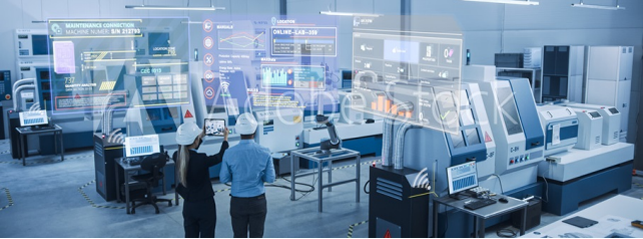
The MCIS department aims to study complex eco-technical systems.
These systems are mainly used in the application areas of manufacturing industry, environment and energy (e.g. power plants, intelligent (wood) buildings, production and logistics systems). By the prefix "eco", these types of systems are based, in part of their development, on emerging paradigms such as the circular economy, industrial ecology, functionality-use. "System" is thus to be understood, on the one hand, as the object of research (from the industrial or socio-technical field) with a strong presence of digital technologies conferring on them, where appropriate, an ambient or even "intelligent" character, and on the other hand, as inducing a methodology advocating, around the systemic paradigm and life cycle, an integrative vision to understand, as a whole, the problems related to it.
In this context, MCIS's scientific issues concern more specifically the decision-making processes necessary to control and manage flows with regard to both the main performance requirements (management of physical or energy flows in line with information flows), but also the operational reliability and quality of service of communication networks.
The general objective of the research is therefore to define methodologies, models and tools in order to have a global and coherent representation of the target system studied in order to help optimal decision-making, on the one hand, and to investigate in terms of structuring vision, on the other hand, the requirements to respect the following 3 system orientations contributing to the target system:
- Overall engineering of the system's operational safety,
- Engineering the management of the system's physical or energy flows, in synchronization with its information flows
- Engineering of the system's communication networks, in support of its information flows and quality of service
Keywords of the department: "Eco-technical" system, system approach, operating safety, ambient intelligence, sensor networks, Green IT, sustainable development.
- Scientific themes targeted and addressed by scientific projects:
- Intelligent System and Objects in Interaction (S&O-2I);
- Green Networking (GN);
- Operational safety, PHM and maintenance (S-PHM2)
![]() Organization of the department
Organization of the department
To meet the scientific challenge proposed while seeking to preserve as a major originality the specificity of "eco-technical" systems, the management of the MCIS department is matrix-based to ensure coordination, coherence and dynamics between the work of its actors, namely:
- A vertical dimension where each scientific project develops/ deepens its discipline and field of competence (to anticipate scientific disciplinary evolutions)
- A horizontal or transversal dimension, allowing scientific projects to amplify synergies (opening up to new skills) around "unifying research fields". These research areas aim to have a strong regional or national impact and respond, for example, to an important societal issue (e.g. energy and waste management) or to contribute to the socio-economic development of a professional sector (e.g. timber construction).


